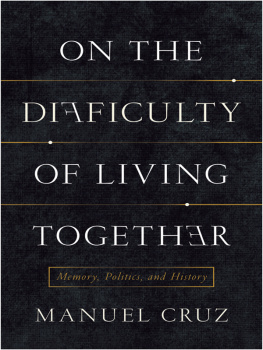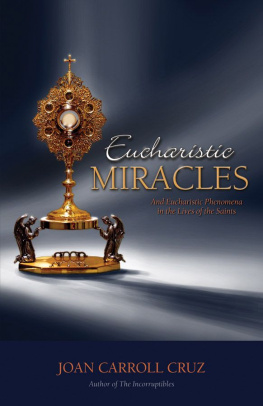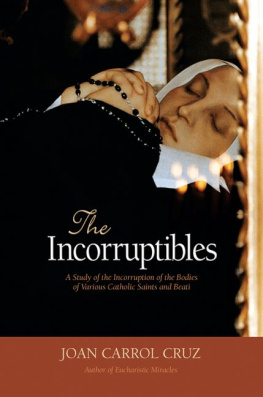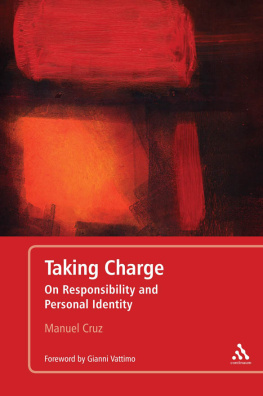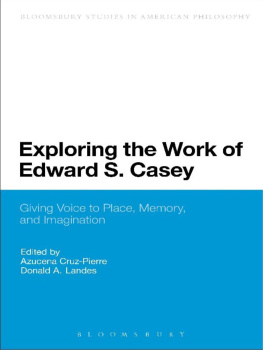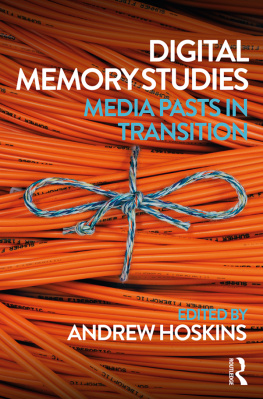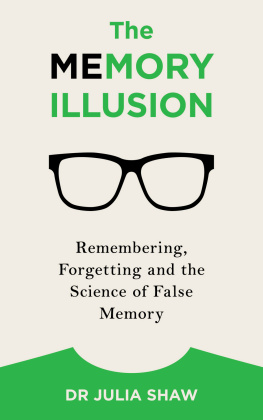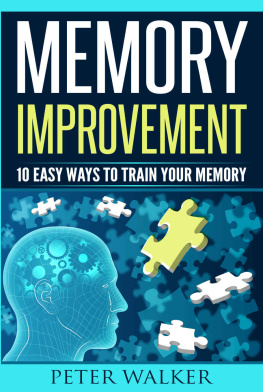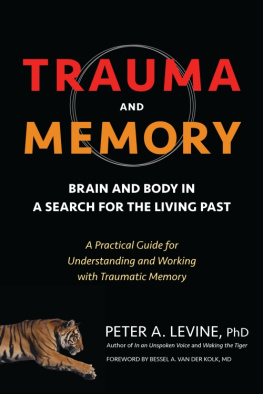Table of Contents
ON THE DIFFICULTY OF LIVING TOGETHER
New Directions in Critical Theory
NEW DIRECTIONS IN CRITICAL THEORY
AMY ALLEN, GENERAL EDITOR
New Directions in Critical Theory presents outstanding classic and contemporary texts in the tradition of critical social theory, broadly construed. The series aims to renew and advance the program of critical social theory, with a particular focus on theorizing contemporary struggles around gender, race, sexuality, class, and globalization and their complex interconnections.
For a complete list of books in the series, see .
ON THE DIFFICULTY OF LIVING TOGETHER
MEMORY, POLITICS, AND HISTORY
Manuel Cruz
Translated by Richard Jacques
COLUMBIA UNIVERSITY PRESS NEW YORK
COLUMBIA UNIVERSITY PRESS
Publishers Since 1893
NEW YORK CHICHESTER, WEST SUSSEX
cup.columbia.edu
Copyright 2016 Columbia University Press
All rights reserved
E-ISBN 978-0-231-54139-8
Library of Congress Cataloging-in-Publication Data
Names: Cruz, Manuel, 1951- author.
Title: On the difficulty of living together : memory, politics, and history /
Manuel Cruz ; Translated by Richard Jacques.
Other titles: Acerca de la dificultad de vivir juntos. English
Description: New York : Columbia University Press, 2016. | Series: New directions in critical theory | Includes bibliographical references and index.
Identifiers: LCCN 2015039842 | ISBN 9780231164009 (cloth : alk. paper) | ISBN 9780231541398 (e-book)
Subjects: LCSH: Memory (Philosophy) | MemorySocial aspects. |
MemoryPolitical aspects. | Political sciencePhilosophy. | HistoryPhilosophy.
Classification: LCC BD181.7 .C77713 2016 | DDC 128/.3dc23
LC record available at http://lccn.loc.gov/2015039842
A Columbia University Press E-book.
CUP would be pleased to hear about your reading experience with this e-book at .
Cover design: Faceout Studio
References to websites (URLs) were accurate at the time of writing. Neither the author nor Columbia University Press is responsible for URLs that may have expired or changed since the manuscript was prepared.
CONTENTS
I have thought a good deal about which statements I should emphasize in these opening pages. I acknowledge that I was worried that the context this book was written in (its interpretive horizon, as Gadamer would probably have said), so different from the one the potential reader of this English edition inhabits, could hamper a proper understanding. After all, my words were written in a particular reality and were trying to provide an answer to some of the questions it was raising for me. By categorizing that answer, by trying to give it a certain abstract and general shape, I was actually putting its universality, the value of any truth it might contain, to the test. That is why I resisted the temptation to retouch the statements, to try to adapt them to the different reality from which my new readers will interpret them: there would have been something deeply dishonest about succumbing to such a temptation. Because the best service a text can render the person reading it is precisely to question some of the basic, unarguable, obvious convictions that have guided him. If, in order to protect myself from the reproach that what might have been valid for my context is not so for my new readers, I had written the things I supposed they were expecting, I would have deprived them of the opportunity not so much to criticize me as to benefit from a different look at their reality, to see it, albeit just for a second, in a different light.
That last expectation is legitimate. Above and beyond the quite different ways the same problems are posed in different realities, the persistence of certain concerns leads us to suspect that we are looking at constituent dimensions of what, using the title of one of Arendts greatest works, we might well call the human condition. Because the impulse that leads us to confront our past, to measure ourselves against it, to try to draw from the story of what has happened lessons that will help us to go on our way freed from the worst of ourselves is human, incorruptibly human. And hopeful of living together in a different way, as far as they will allow us.
The question of from where the past is of interest to us is therefore fundamental. As a historian of philosophy concentrating on the study of contemporary ideas, I have been gladly obliged on numerous occasions to reflect on that peculiar object of thought we call the present. An object constructed of many different elements. The present cannot be confused with the here and now: it is the result of a process in which, as well as our desires and expectations (which make our reality the raw material for what does not yet exist, its future substance), both the objectively received inheritance and the treatment we have submitted it to occupy a central, primordial place. It seems timely to paraphrase Sartre: the important thing is not what they have done with us, but what we do with what they have done with us.
That is a principle that should shed light on another paraphrase, which provides the title of a section of . Just as the American philosopher Richard Rorty was able to muster good arguments to defend what he called the priority of democracy to philosophy, I have ventured in the pages that follow to try to give good reasons for the idea that, in relation to history, the primacy always belongs to politics. Let us try to bring an initial line of argument that will make the idea minimally intelligible so that the reader is in a position to enter into its development.
I acknowledge that I was surprised by the casual way in which the statement was taken for granted. Is it actually true that memory is flagging?
We can accept that there are commonplaces, but unanimous ones are frankly tedious. If the former are clichs, the latter are banalities, false proofs that have been incorporated into ordinary discourse to the point of automatism, that have become incrusted in our language until they come to be imperceptible, making our statements sound right in some obscure way, slipping into them a meaning that always remains veiled. And so for some time a positive valuation of memory has been one of those undisputed, not to say universally accepted, commonplaces. We can always argue about whether recollection of the past is paid the attention it deserves in practice, but what seems clear is that it is unusual today to find someone who says he is decidedly against memory or, the other way around, admits to being a fervent supporter of forgetting at any price.
However, the rigid opposition between remembering and forgetting, in which each of the pair is allotted the positive or the negative value (with no intermediate possibilities), has not helped reach a critical clarification of the matter. In the face of that flat opposition, we should, as in this book, introduce a more shaded perspective from which it is possible to distinguish different forms of both remembering and forgetting in order to draw the relevant conclusions. For example, that there can be healthy variants of forgetting, as well as decidedly unhealthy (if not pathological) forms of remembering. Remembering is notcannot bean end in itself, nor is it a supreme, ultimate value that cannot be impugned on any grounds. The mere exercise of memory still guarantees us nothing, however much some people persist in arguing that it is an unambiguously progressive activity on the sole grounds that it guarantees that we shall not fall again into the errors of the past. As the French historian Jacques Le Goff has pointed out in his book

